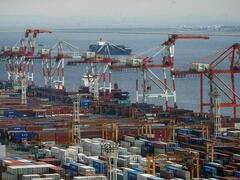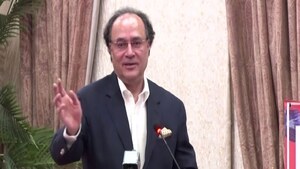Europe's policy on genetically modified (GMO) crops and foods came under fire on Thursday from EU environment ministers, many of whom complained of a lack of transparency and that their concerns were often ignored.
Despite ending its unofficial moratorium on approving new GMO products in 2004, a de facto ban recently criticised at the World Trade Organisation, the EU's pace of new GMO approvals has been painfully slow - some eight products in nearly two years.
All those authorisations have been issued by the European Commission, using a legal default procedure that kicks in when EU governments repeatedly fail to agree after a given period of time, within the bloc's complex weighted voting system.
In many cases, more than half of the EU-25 has opposed the approval. But that simple majority is not enough, since EU rules require a weighted majority to approve or reject a GMO approval.
The weighting depends on a country's size and economic power, among other factors.
"It doesn't do much for democratic legitimacy if the European Commission approves specific GMOs even in the face of objections from a majority of member states," Danish Environment Minister Connie Hedegaard said in a public debate on GMO policy.
"This procedure does not seem to be able to make the wishes of a majority of member states possible. There is a big majority against GMOs in public opinion," Stavros Kaloyannis, Greece's state environment secretary, told the EU ministers.
Several countries called for the GMO voting system to be changed, saying authorisations should only be issued if a clear majority of EU states were in favour. Changing the system is no easy task, since it also applies to several other policy areas.
Despite the EU ending its blockade on new GMO products, the bloc's 25 governments are still deeply divided on the merits and disadvantages of GMO foods. The WTO verdict on EU policy seems to have done little to change that long-standing stalemate.
Debates on biotech policy are always heated and usually split into a clear "pro" and "anti" camp. Neither can muster enough support to approve or reject a new approval, ensuring deadlock. More and more countries choose to sit on the fence.
Britain, Finland and the Netherlands always vote in favour, while Austria, Greece and Luxembourg are consistently opposed.
Several ministers called for increased transparency in GMO policy, and more national government and public involvement, to raise confidence in EU decision-making among consumers. Polls show more than 70 percent of Europeans oppose biotech foods.
BR100
15,059
Decreased By
-56.5 (-0.37%)
BR30
42,931
Decreased By
-117.2 (-0.27%)
KSE100
148,815
Decreased By
-677.8 (-0.45%)
KSE30
45,206
Decreased By
-312 (-0.69%)





















Comments
Comments are closed.